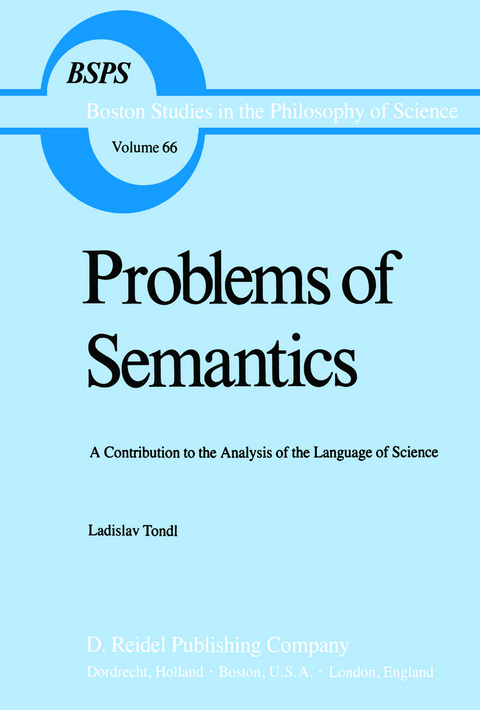
Problems of Semantics
Kluwer Academic Publishers (Verlag)
978-90-277-0316-3 (ISBN)
I. The Semantic Problem—Sources and Themes.- II. The Concept of Semantics and Prerequisites for the Investigation of Semantic Problems.- 1. The Concepts of Object Language and Metalanguage.- 2. The Semantic Level of Analysis and its Relations to the Syntactic and Pragmatic Levels.- III. Semantic Concepts.- 1. Semantic Concepts and their Relations in Common Parlance.- 2. Semantic Concepts in Formalised Languages.- IV. The Semantics of Logical Concepts.- 1. Problems of L-Semantics.- 2. The Semantics of Logical Concepts on the Basis of the Concept of Interpretation.- V. Sense and Denotation.- 1. Frege’s Conception of Sense and Denotation.- 2. The Theory of Descriptions.- 3. The Method of Extension and Intension.- 4. The Problem of Naming.- 5. Synonymity.- VI. The Criterion of Sense.- 1. The Formulation of the Problem.- 2. The Operationist Criterion of Sense.- 3. The Verifiability Criterion of Sense.- 4. The Translatability Criterion of Sense.- 5. Sense and the Empirical.- 6. ‘Theoretical Concepts’ and the Relativity of the Empirical Starting Point.- 7. Problems of Sense and Reduction Procedures.- VII. Vagueness.- 1. Vagueness and the Un-Sharpness of Boundaries.- 2. Sources of Vagueness and Ways of Analysing Vagueness.- 3. Vagueness, Ambiguity and Denotational Opacity.- VIII. Semantics and Some Problems of Ontology.- 1. Semantics and Ontic Decision.- 2. Nominalism, Platonism and Semantics.- 3. Analytical and Synthetic Aspects in the Language of Science.- IX. An Outline of the Evaluation of the Results of Scientific Activity in Terms of Semantic Information.- 1. The Scope for Evaluating Scientific Results.- 2. Brillouin’s Attempt at an Informational Evaluation of Scientific Laws.- 3. Linguistic Devices in Tasks of the Systematising Type.- 4. The Concept of‘Decision Base’ and the Evaluation of a Decision Base.- 5. The Relevance of A Posteriori Data.- 6. Evaluation of the Goal Complex and the Concept of ‘Epistemic Gain’.- X. The Semantics of Preference Attitudes.- 1. The Role of Preference and Preference Ordering.- 2. The Comparability Principle as a Presupposition for the Construction of a Preference System.- 3. Preferences of Things and Preferences of States of Affairs.- 4. Preference ‘Ceteris Paribus’.- 5. The Concept of ‘Preferable States of Affairs’ as a Qualitative Concept.- 6. Preference as a Propositional Attitude.- Conclusions.- XI. The Problem of Informational Synonymity.- 1. The Traditional (Leibnizian) Criterion of Identity and the Problem of Semantic Identification.- 2. The ‘Salva Veritate’ Criterion.- 3. The Criterion of ‘Salva Relatione’ and the Concept of ‘Informational Synonymity’.- 4. Informational Relevance and the Concept of ‘Strict Informational Synonymity’.- XII. An Outline of the Semantic Evaluation of Graphic Communication.- 1. Introductory Remarks.- 2. Graphic Communication.- 3. The Semantics of a Picture Shape.- 4. Informational Synonymity and the Informational Evaluation of a Picture Shape.- 5. Informational Synonymity and the Time Factor.- Notes.- References.- Index of Names.- Index of Subjects.
| Erscheint lt. Verlag | 30.9.1981 |
|---|---|
| Reihe/Serie | Boston Studies in the Philosophy of Science ; 66 |
| Übersetzer | David Short |
| Zusatzinfo | XIV, 407 p. |
| Verlagsort | Dordrecht |
| Sprache | englisch |
| Maße | 155 x 235 mm |
| Themenwelt | Geisteswissenschaften ► Philosophie ► Allgemeines / Lexika |
| Geisteswissenschaften ► Philosophie ► Sprachphilosophie | |
| Naturwissenschaften | |
| ISBN-10 | 90-277-0316-7 / 9027703167 |
| ISBN-13 | 978-90-277-0316-3 / 9789027703163 |
| Zustand | Neuware |
| Haben Sie eine Frage zum Produkt? |
aus dem Bereich


